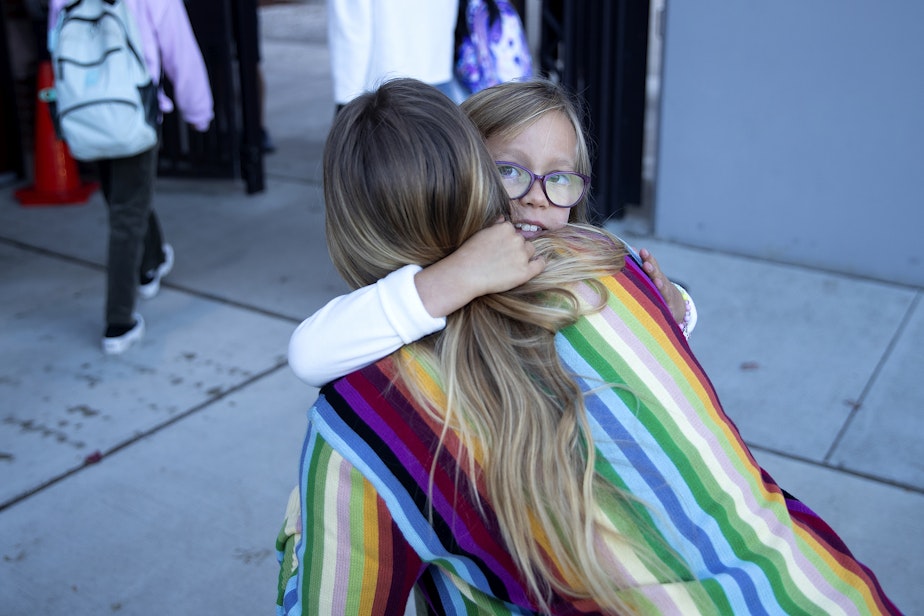Seattle families are relieved — but still worried — now that school closures are off the table next year

With Seattle schools spared from closures next school year, some parents and educators breathed a sigh of relief on Wednesday — at least temporarily.
Erin MacDougall, a parent of two students, applauded administrators’ new proposal to push back the timeline for school closures and not shutter any buildings next year, as many had anticipated.
But MacDougall said she and other parents who’ve joined All Together for Seattle Schools, a newly-formed citywide parent advocacy group, remain concerned about what’s to come in the fall of 2025, when district leaders expect closures to begin.
They also worry they’ll continue to feel like their voices are ignored or not heard as district leaders work to fill next year’s projected $105 million deficit — and another two years of even larger expected budget gaps.
“Knowing that this is still very much a focus in the following year puts a lot of stress on our families and school communities who are still suffering many years into this pandemic life,” MacDougall said at Wednesday’s school board meeting.
“Before you commit to cutting programs, please have an honest conversation with the community about the budget needs.”
Sponsored
The district’s precarious financial situation has been fueled by declining enrollment, including a loss of nearly 5,000 students over the last five years. Because state education funding is largely based on enrollment numbers, that five-year drop cost the district about $81 million of revenue.
Last year, the district grappled with — and ultimately filled — a $131 million shortfall.
The situation is not likely to improve anytime soon. District officials say they’ve consulted with multiple outside demographers and none anticipate significant enrollment growth within the next decade.
“Our current budget shortfall demands our collective attention and strategic planning,” said Superintendent Jones. “We are committed to addressing it in a manner that reflects fiscal responsibility, actively incorporates feedback of our community members, and ensures that our schools continue to provide high quality education.”
To achieve financial stability and those other goals, district leaders said Wednesday that school consolidation has to be a central piece of the puzzle.
Sponsored
In district leaders’ presentation to the board Wednesday, they referenced data showing district enrollment peaked in 1964 with just over 94,000 students. At that time, the district had 117 school buildings.
By comparison, this year, the district serves about 48,000 students and has 104 schools — including 28 elementary schools with less than 300 students each. District officials claimed none of the districts surrounding Seattle — such as Bellevue, Renton, Lake Washington, Shoreline, and Highline — currently operate schools with fewer than 300 kids.
Fred Podesta, the district’s chief operations officer, said the problem with having so many schools is that the district has fixed costs for each building, but funding is based on enrollment. Jones plans to present a plan for a “system of well-resourced schools” this spring. It may include school closures and other budget cut measures such as grade level reorganizations and other program adjustments and restructuring.
In the meantime, Jones proposes the district use a number of tactics to close next year’s budget gap, such as short-term borrowing; liquidating assets; reducing staff at both the central office and schools; changing transportation offerings; charging fees for athletics and other activities; and increasing class sizes at middle and high schools.
Whatever the district does, parents pleaded with leaders Wednesday to transparently communicate and collaborate with them before they make decisions.
Sponsored
“You all need to better partner with us in the face of this financial crisis,” said Alex Wakeman Rouse, another parent from All Together for Seattle Schools.
Although Wakeman Rouse doesn’t agree that school closures are a good solution, she implored the district to start engagement with families about it now.
Other parents also worried about how budget cuts will affect school communities this year — especially after about half of the district’s schools were affected by class size adjustments last month.
“Even in light of closures being deferred, we in Decatur fear that we will fall victim to the vaguely referenced ‘limited program adjustments’ and I ask that our community please, please be genuinely consulted,” said Erika Ruberry, the parent of a second grader at Decatur Elementary.
Jones repeatedly emphasized the district’s intentions to do just that.
Sponsored
“In the spirit of collaboration and transparency, I encourage your continued participation in this conversation,” Jones said during the presentation Wednesday. “Your insights are crucial as we work together to ensure our financial decisions align with our educational goals.”




